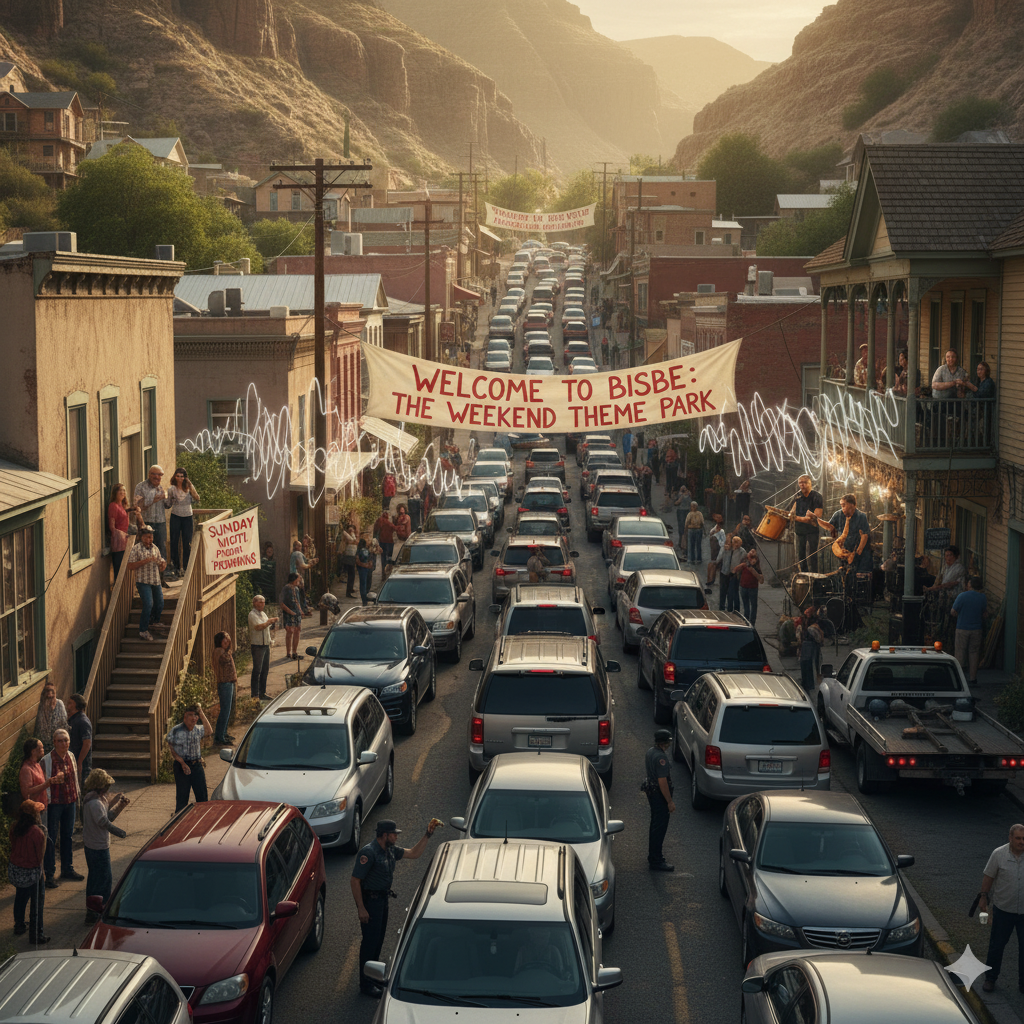Last updated on October 29, 2025
Life in Bisbee operates on a starkly divided schedule. From Monday morning until about noon on Friday, the town is deceptively peaceful. There is a quiet hum of residents going about their business, a slow-paced existence that feels like the very thing you came here to find. You can find a parking spot. You can walk down the street without navigating a human traffic jam. This brief, calm period is the bait. It’s designed to make you forget what’s coming. Because every Friday afternoon, the invasion begins, and the town you thought was your home transforms into a theme park where you are an unwilling and unpaid exhibit.
The weekend tourists descend in a swarm, clogging the narrow, winding roads with their oversized SUVs and minivans. The precious few parking spots vanish, replaced by a slow-moving crawl of vehicles with out-of-state plates. If you live anywhere in Old Bisbee, you learn to move your car to a safe, defensible position by Friday morning and not touch it again until Sunday evening. To leave your spot is to surrender it to the horde. You are, in effect, under a weekend house arrest, a prisoner of the very tourism that supposedly keeps the town alive.
The relative quiet of the weekday is shattered by a cacophony of noise. The bars that were sleepy during the week are now overflowing, spilling drunken revelers onto the sidewalks. The sound of bad cover bands and loud arguments echoes unnaturally through the canyon, bouncing off the walls and directly into your “charming”, single-paned windows. Because of the unique acoustics of the canyon, a conversation shouted a quarter-mile away can sound like it’s happening on your front porch. Sleep becomes a distant memory.
You will also quickly lose your sense of privacy. The tourists treat the entire town as their personal playground and photo backdrop. They will wander up your private staircases, pose for selfies on your porch, and peer into your windows as if you are part of a historical diorama. They see your home not as a private residence, but as an extension of the town’s quirky aesthetic, a prop for their Instagram feed. The constant, low-grade trespass becomes a defining feature of your existence. You are no longer a resident; you are a zookeeper, and your life is the main attraction.
This invasion dictates the rhythm of the entire town. The businesses you rely on often have bizarre, tourist-centric hours. The best restaurants may be closed Monday through Wednesday, then be completely slammed and inaccessible to locals on the weekend. The town’s resources, from law enforcement to public works, are stretched thin dealing with the weekend influx, leaving residents to fend for themselves. Everything is geared toward extracting the maximum amount of cash from visitors in a 48-hour window.
The very “weirdness” that is marketed to the world is a performance for their benefit. The art, the music, the events—they are not organic expressions of a vibrant community, but a curated product designed for tourist consumption. As a resident, you are merely a background actor in this weekend stage play. The town isn’t for you. It is for them. And once you realize that you are living in a place that values a weekend visitor’s dollar more than your year-round quality of life, the charm fades with astonishing speed.
